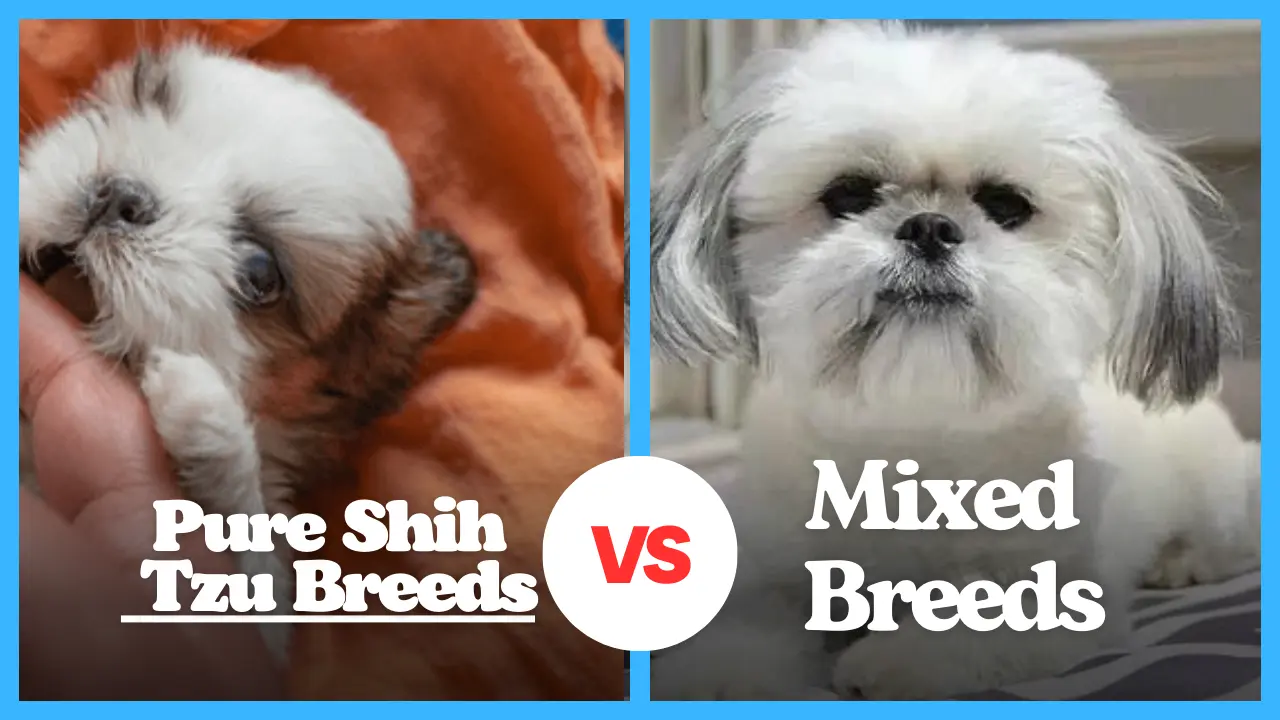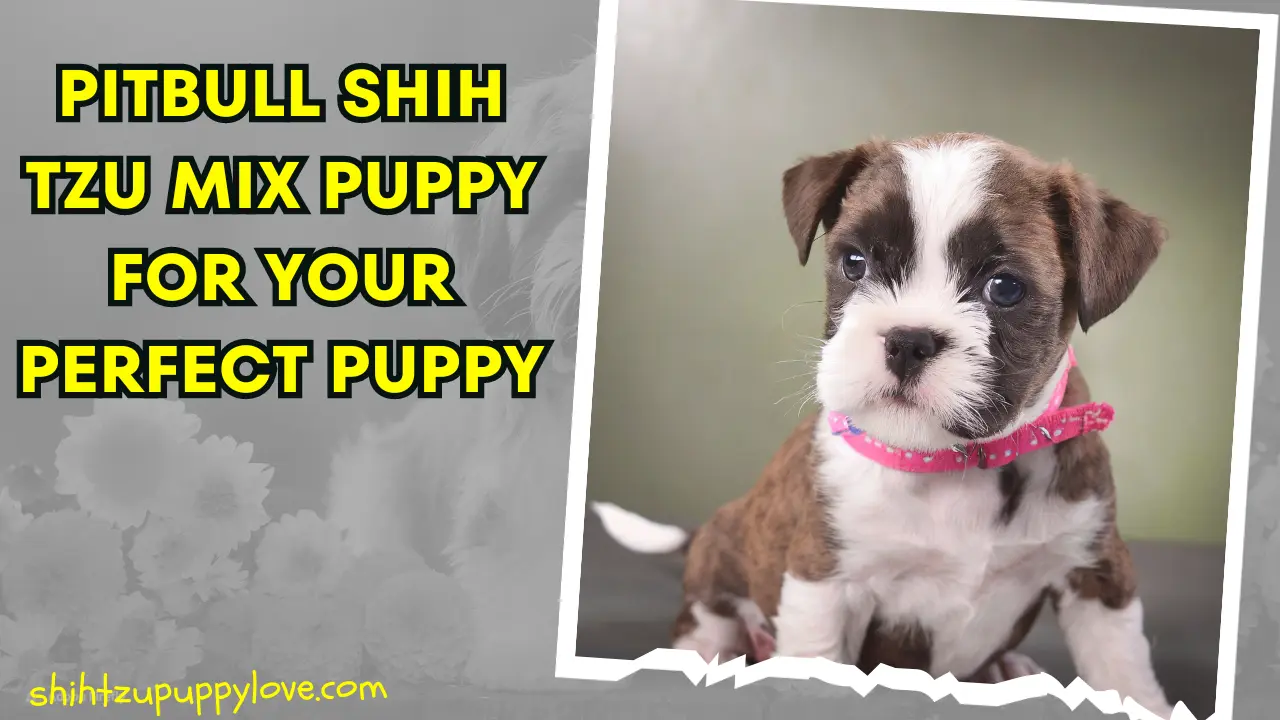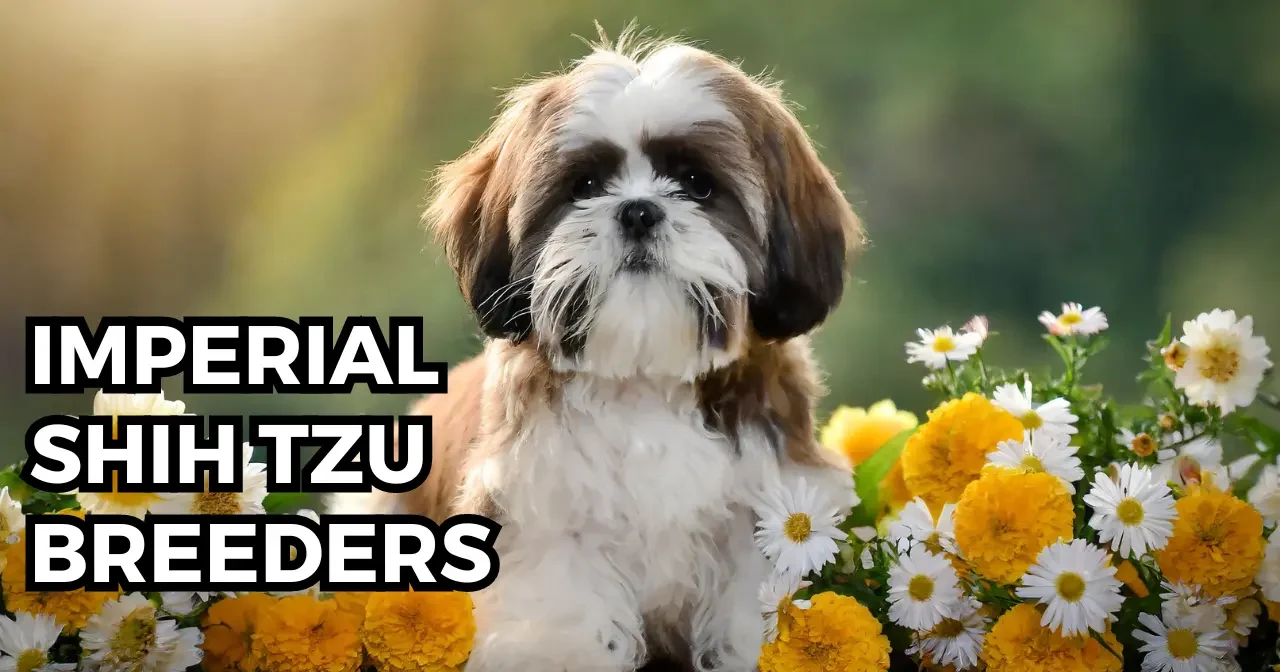Pure Shih Tzu Breeds vs. Mixed Breeds: Which Is Right for You?
Are you considering getting a Shih Tzu as a new addition to your family? If so, you may be wondering whether to choose a purebred Shih Tzu or a mixed breed. Both options have their own unique advantages and considerations, so it’s important to understand the differences before making your decision.
History of the Shih Tzu:
The Shih Tzu is a Chinese breed of dog that was developed from various other breeds, including the Pekingese and Lhasa Apso. The breed was first introduced to the Western world in the 1930s, and has since become one of the most popular dogs in the United States.
The Shih Tzu is thought to have originated in Tibet, where it was used as a companion dog by Tibetan monks. From Tibet, the breed spread to China, where it became a favorite of Chinese emperors and their families. The breed eventually made its way to Japan, where it was also prized as a companion dog.
In the early 1900s, a pair of Shih Tzus were brought to England from China by Lady Horner. The dogs quickly became popular among British nobility, and were soon being exported to other European countries. In 1930, the first Shih Tzus arrived in the United States, and they have been steadily gaining in popularity ever since.
Types of Shih Tzu Breeds:
Mixed breed Shih Tzus are becoming more popular as people learn about the many benefits they offer. However, with so many different types of Shih Tzus to choose from, it can be hard to know which one is right for you. Here is a look at some of the most popular types of Shih Tzu breeds:
1. American Shih Tzu: Also known as the Standard Shih Tzu, these dogs are the most common type of Shih Tzu. They typically weigh between 9 and 16 pounds and stand 10 to 12 inches tall at the shoulder. American Shih Tzus have a wide range of coat colors, including black, white, brown, and red.
2. Imperial Shih Tzu: As the name suggests, Imperial Shih Tzus are smaller than Standard Shih Tzus. They typically weigh between 4 and 7 pounds and stand 8 to 11 inches tall at the shoulder. Like Standard Shih Tzus, they come in a variety of coat colors.
3. Teacup Shih Tzu: As their name implies, Teacup Shih Tzus are even smaller than Imperials. They typically weigh less than 4 pounds and stand less than 8 inches tall at the shoulder. Because of their small size, Teacup Shih Tzus require special care and attention. They are also more susceptible to health problems due to their fragile bones and delicate constitution
Overview of Popular Crossbreed Combinations
There are many popular crossbreed combinations of Shih Tzus, each with their own unique set of characteristics. Some of the most popular cross breeds include the Maltese Shih Tzu, the Lhasa Apso Shih Tzu, and the Yorkshire Terrier Shih Tzu. Each of these crossbreeds has a different appearance and set of personality traits that make them well-suited for different lifestyles.
The Maltese Shih Tzu is a small breed that is known for being affectionate and gentle. They are typically good with children and other pets, making them an ideal choice for families. The Lhasa Apso Shih Tzu is a medium-sized breed that is lively and playful. They make great companions for active people and can do well in homes with other pets. The Yorkshire Terrier Shih Tzu is a small breed that is energetic and curious. They are perfect for people who want a lapdog that will also keep them entertained.
Quick Comparison: Pure vs. Mixed on Grooming, Lifestyle, Health Concerns, Cost and Appearance
When you’re looking for a new furry friend, you may be wondering whether a purebred or mixed breed Shih Tzu is the right fit for your lifestyle. Here’s a quick comparison of some key factors to help you make your decision:
Grooming: Purebred Shih Tzus require daily grooming to maintain their trademark long, flowing coat. Mixed breed Shih Tzus may have a coat that is shorter and less dense, which is easier to care for.
Lifestyle: If you’re looking for a laid-back companion to cuddle with on the couch, either type of Shih Tzu will do. However, if you want a dog that can keep up with an active lifestyle, a mixed breed Shih Tzu may be a better choice since they tend to have more energy than their purebred counterparts.
Health Concerns: Purebred dogs are more likely to inherit genetic health problems due to inbreeding. Mixed breed dogs are healthier overall, but it’s important to ask the breeder about any health issues that may be present in the pup’s parents or grandparents.
Cost: Purebred Shih Tzus typically cost more than mixed breed dogs since they are “pure” and considered desirable by many people. However, there are many mixed breed Shih Tzus who need homes and are available at cheaper prices from shelters or rescue groups.
What to Look For When Shopping For a Pure or Mixed Breed Shih Tzu
There are a few things you should take into account when shopping for either a pure or mixed breed Shih Tzu. The first is whether or not you want a hypoallergenic dog. While all Shih Tzus are low-shedding, some mixed breeds may have other hypoallergenic traits that can be beneficial for those with allergies. Second, consider the size of the dog and whether or not you want a small or large Shih Tzu. Mixed breeds can vary in size, so this is something to keep in mind. Third, think about the coat type and how much grooming you’re willing to do. Purebred Shih Tzus typically have a long, silky coat that requires daily brushing and occasional professional grooming, while mixed breeds may have a shorter coat that is easier to maintain. Research the health conditions common to both purebred and mixed breed Shih Tzus so that you can be prepared for any potential health issues your dog may experience down the road.
Pure Shih Tzu Breeds:
Purebred Shih Tzus are dogs that have two parents of the same breed, resulting in puppies that are genetically similar to their parents. There are several benefits to choosing a purebred Shih Tzu:
- Predictable Traits: With a purebred Shih Tzu, you can have a good idea of what to expect in terms of appearance, temperament, and health. Breeders carefully select breeding pairs to ensure that certain desirable traits are passed on to the offspring.
- Show Potential: If you’re interested in participating in dog shows or competitions, a purebred Shih Tzu may be the right choice for you. Purebred dogs often have specific breed standards that they must meet in order to compete.
- Health Testing: Reputable breeders of purebred Shih Tzus conduct health testing on their breeding dogs to minimize the risk of passing on genetic diseases. This can provide peace of mind knowing that your new puppy is less likely to develop certain health issues.
Mixed Breeds:
- Unique Personalities: Mixed breed Shih Tzus can have a combination of traits from both parent breeds, resulting in a unique and unpredictable personality. This can be exciting for owners who enjoy the element of surprise.
- Health Benefits: Mixed breed dogs often have a lower risk of inheriting genetic diseases compared to purebred dogs. This is known as hybrid vigor and is a result of the increased genetic diversity from the two parent breeds.
- Availability: Mixed breed Shih Tzus are often more readily available and may be easier to find than purebred Shih Tzus. This can be advantageous if you’re looking to adopt or rescue a dog.
Mixed breed Shih Tzus, also known as designer dogs or hybrids, are the result of crossing a Shih Tzu with another breed. Here are some things to consider if you’re thinking about getting a mixed breed Shih Tzu:
Which Is Right for You?
Ultimately, the decision between a purebred Shih Tzu and a mixed breed Shih Tzu depends on your personal preferences and lifestyle. If you have specific traits or characteristics in mind and want a dog that closely matches those, a purebred Shih Tzu may be the better choice for you. On the other hand, if you’re open to surprises and want a dog with a unique personality, a mixed breed Shih Tzu could be a great fit.
Regardless of which option you choose, it’s important to do your research and find a reputable breeder or rescue organization. Take the time to meet the puppy or dog, ask questions about their health and background, and ensure that they will be a good fit for your family.
What is the best breed to get with a Shih Tzu?
When it comes to finding the best breed to get along with a Shih Tzu, there are several factors that should be taken into consideration. Firstly, the size of the potential companion should be considered because Shih Tzus are small dogs and may feel threatened by larger breeds. Secondly, their temperament is important since they can be quite stubborn at times; therefore, a breed that is known for being obedient and easy-going would make a good match. Thirdly, compatibility in terms of exercise needs should also be considered as some breeds require more physical activity than others. With these factors in mind, some of the best dog breeds to consider include Bichon Frise, Cavalier King Charles Spaniel or Maltese as they share similar temperaments and energy levels with Shih Tzus. Additionally, these breeds are relatively smaller in size which makes them less intimidating for your little furry friend. Ultimately though, every dog has its own unique personality so it’s important to introduce them carefully and observe how they interact before making any final decisions on what breed might work well alongside your beloved shih tzu!
How do I choose a Shih Tzu?
There are several factors that you need to consider. Firstly, you should do some research on the breed’s characteristics and temperament to determine if they are suitable for your lifestyle and living situation. The Shih Tzu is known for being affectionate, playful, and loyal companions who require regular grooming due to their long coat. Additionally, you should look for reputable breeders or rescue centers that prioritize the health and well-being of their dogs. It is crucial to ask about any potential health issues or genetic predispositions in both the puppy’s parents before making a decision. Moreover, spend time with the puppies before selecting one as this will enable you to observe its behavior and personality traits closely. Ideally, choose a Shih Tzu who exhibits friendliness towards people and other animals while displaying signs of confidence without aggression or fearfulness. Ultimately by considering these factors carefully when choosing a Shih Tzu will ensure that you bring home a happy and healthy companion who fits perfectly into your family dynamic.
How can you tell a good Shih Tzu?
Identifying a good Shih Tzu, there are certain characteristics that you can look out for. Firstly, their coat should be thick and lustrous, with no bald patches or signs of matting. A healthy Shih Tzu will also have bright, clear eyes that are free from any discharge or cloudiness. Another key indicator is their temperament – a well-adjusted and happy Shih Tzu will be friendly towards strangers and enjoy being around people. They should also be alert and lively without being overly hyperactive or anxious. In addition to this, a good Shih Tzu will have clean ears with no signs of redness or irritation, as well as strong teeth and gums that are free from decay. Lastly, it’s important to consider the breeder when selecting your furry friend – make sure they’re reputable and take proper care of their animals before making any decisions about purchasing a Shih Tzu puppy.
What does a pure breed Shih Tzu look like?
The Shih Tzu is a small and compact breed known for its long, flowing coat that often comes in various colors such as white, black, brown, gold or a combination of these. With a round head and large dark eyes set wide apart on their face, the Shih Tzus have an adorable expression that makes them incredibly endearing to many dog lovers. Their short snout and floppy ears give them a charming look while their sturdy body structure gives them an almost regal appearance when they walk. The Shih Tzu’s trademark double coat requires regular grooming to prevent matting and tangling but also provides excellent insulation from both heat and cold weather. Overall, with its unique features and sweet temperament, the purebred Shih Tzu has become one of the most popular toy breeds around the world today.
American Shih Tzu vs European Shih Tzu:
The Shih Tzu is a beloved dog breed that has captured the hearts of many throughout the world. However, there are two distinct types of Shih Tzus – American and European – each with their own unique characteristics. The American Shih Tzu tends to have a shorter snout and a more prominent forehead, giving them an adorable teddy bear-like appearance. They also tend to be smaller in size compared to their European counterparts. On the other hand, the European Shih Tzu has longer hair and a flatter face, making it appear more regal and elegant. Moreover, they often have larger eyes and overall facial features than their American counterparts.Despite these differences in appearance, both types of Shih Tzus share similar temperaments – friendly, affectionate, playful and loyal dogs who love being around people. Both breeds require regular grooming due to their long coats which can easily become matted if not cared for properly.In summary, while there may be some physical differences between American and European Shih Tzus; when it comes down to personality traits such as loyalty & friendliness towards humans – they are quite similar! Whether you prefer the cuddly teddy-bear look or the dignified elegance of this breed’s two variations; one thing is for certain: owning either type will bring joy into your home!
How to check purebred shih tzu:
If you’re looking to add a Shih Tzu to your family, it’s important to know how to check if they are purebred. The first thing you should do is research reputable breeders and ask for documentation of the dog’s lineage. A purebred Shih Tzu should have papers verifying their pedigree from an official organization such as the American Kennel Club (AKC). You can also look for physical traits that are common in this breed, such as a round head with a short snout, large expressive eyes, and long ears that hang down close to their face. Additionally, take note of their coat which should be thick and luxurious with no bald patches or signs of matting. Purebred Shih Tzus also tend to have distinct personalities characterized by loyalty and playfulness. By taking these factors into consideration when selecting your new furry friend, you can ensure that you’re welcoming home a genuine purebred Shih Tzu who will make an excellent companion for years to come.
Bonus Tips: How to Find a Quality Breeder:
When looking for a quality Shih Tzu breeder, it’s important to do your research. There are many reputable breeders out there, but there are also some who aren’t so reputable. Here are some things to look for when you’re doing your research:
– Make sure the breeder is registered with the American Kennel Club or another similar organization.
– Ask to see the health clearances of the parents of the puppies you’re interested in. Health clearances show that the parents have been tested for certain hereditary conditions and are cleared as being free of those conditions.
– Ask about the breeder’s guarantee and return policy. A good breeder will stand behind their puppies and offer a money-back guarantee if something is not right with the puppy you purchase.
– Meet the breeder in person and take a tour of their facilities. This will give you a good idea of how they operate and whether or not they maintain high standards of care for their dogs.
Pros and Cons of Purebred vs. Mixed Breeds:
When it comes to choosing a Shih Tzu, you have two main options: a purebred or a mixed breed. Both have their own set of pros and cons that you should take into account before making your decision.
Purebred Pros:
– You know exactly what you’re getting in terms of appearance and temperament since they are bred to meet specific standards.
– They are often easier to register and show in competitions since they are recognized by the American Kennel Club (AKC).
– You may be able to find one with champion bloodlines, which can add value if you plan on breeding.
Purebred Cons:
– They tend to be more expensive than mixed breeds, sometimes costing hundreds or even thousands of dollars.
– They are more likely to inherit genetic health problems due to inbreeding.
– Some people believe that they contribute to the pet overpopulation problem since mixed breeds can be adopted from shelters for free or low cost.















Post Comment